How Perplexity is Challenging Google's Dominance
Future of search engines: AI-first or traditional approach - a case study
👋🏻 Hey there, welcome to the #25th edition of the Product Space Newsletter, where we help you become better at product management.
Google has long been the undisputed leader in the search engine space. With a market share of over 90% globally, it’s hard to imagine any competitor seriously challenging its dominance.
Yet, as user expectations evolve and new technologies emerge, even giants like Google can face disruption. This case study examines how Perplexity is disrupting the search engine market and potentially reshaping the way we access information online.
Overview
The volume of online data has been increasing dramatically, with estimated 120 zettabytes created in 2023 alone. This is nearly about 60x increase since 2010, with a 60-70% annual growth rate. Despite this massive influx of data, the efficacy of traditional search engines may be deteriorating, making it harder to find the desired information.
For example, in a 2024 study of 7.4K product review queries on Google, Bing, and DuckDuckGo revealed an increase in low-quality, optimized content termed "SEO spam".
Over 50% of consumers in 2020 reported feeling misled by search results, with 25% ending up on unexpected sites. As a result of cluttered search experiences, users increasingly turn to platforms like Reddit and TikTok for answers. The potential for AI advancements to disrupt traditional search engines has become a significant discussion point.
Perplexity is a conversational search engine that uses AI to deliver answers to queries by synthesizing information from various sources available on the internet, differentiating itself from traditional search engines.
Product
Perplexity’s flagship product is an answer engine powered by advanced Large Language Models (LLMs), offering a personalized search experience with features like document analysis, image generation, and educational assistance.
Unlike traditional search engines, Perplexity provides concise, cited responses with follow-up suggestions, ensuring accuracy and transparency while eliminating the need for extensive information mining.
Search Interface
Perplexity's search interface merges conventional search with AI-driven chat, offering instant, sourced answers. The platform synthesizes real-time search results into concise text with citations, allowing users to ask follow-up questions within the same conversation, enhancing engagement and efficiency.
Perplexity tackles two significant challenges inherent in LLM-based information retrieval:
Outdated Data: The answer engine conducts real-time web searches to fetch the most current information.
Hallucinations: By cross-referencing model output with contemporary sources, Perplexity verifies the accuracy and reliability of its responses.
Multiple LLMs
Perplexity employs a hybrid model strategy, utilizing both internally developed models (based on open-source frameworks) and third-party foundational models. Initially relying on OpenAI's GPT-3.5 and Microsoft Bing for search capabilities, Perplexity has since developed its own LLMs built on open-source models like Meta's LLaMA-2 and Mistral AI's Mistral 7B.
Perplexity Pro subscribers can switch between different model series, including OpenAI's GPT, Anthropic's Claude, and Mistral AI's offerings. This flexibility allows users to select models that best suit their specific research needs and preferences, including advanced writing and image generation capabilities.
Platform Integrations
Perplexity offers mobile applications for both iOS and Android platforms, available for free download from the Apple App Store and Google Play Store respectively. These apps emphasize voice search functionality and are designed to enhance information retrieval on mobile devices.
Its Chrome extension is also available, offering features such as:
Instant page summaries
Direct queries from the toolbar
Contextual understanding of viewed content
In January 2024, Perplexity also partnered with Arc browser, integrating its search engine as a default option within the Arc browser interface.
Perplexity Pages
Perplexity Pages, launched in May 2024, is a feature within the Perplexity AI platform that allows users to create visually appealing, comprehensive articles on any topic. It's essentially a content creation tool that leverages Perplexity's AI capabilities to generate informative and engaging content.
Key features include:
Customization for different audience types
Adaptable article structures
Enhanced visual elements
A growing library of user-generated content
Pages caters to a wide range of creators, including educators, researchers, and hobbyists, streamlining the content creation process and enabling users to effectively share their knowledge.
Market Position
Growth
Perplexity AI, since its launch in 2022, has experienced rapid growth, challenging traditional search paradigms and attracting both users and investors.
By March 2023, just four months after its debut, Perplexity reached 2 million monthly active users. Throughout 2023, it continued its upward trajectory, processing half a billion queries and achieved 1 million mobile app downloads within the first three months of its launch on iOS and Android platforms. However, as of February 2024, Google remained the dominant search engine globally, and answers approx. 2 trillion global searches per year.
Customer Base
Initially, Perplexity focused on refining its technology through a small user base on Discord. It later expanded to offer a comprehensive UI and product suite. The platform also features specialized “focus” modes, including Academic for cited article searches, Writing for text generation, a Math answer engine, and tailored searches for entertainment and discussion boards.
In April 2024, Perplexity launched its Enterprise Pro offering, following early access testing with notable companies across industries such as Databricks, Zoom, Stripe, Bridgewater, Hewlett Packard, the Cleveland Cavaliers and others. This phased approach has helped Perplexity establish a solid foundation in serving both individual and enterprise customers.
Market Size
Perplexity operates within the global search engine market, valued at $167 billion in 2021 and expected to grow to $529 billion by 2032, with an 11% CAGR. The growth is driven by increased internet connectivity, with U.S. adult internet usage rising from 86% in 2015 to 95% in 2023, and robust digital advertising spend forecasted to reach $350 billion by 2023.
Additionally, Perplexity is making strides in the generative AI market, which was valued at $29 billion in 2022 and is projected to grow at a CAGR of 47.5% to $668 billion by 2030. While major players like OpenAI and Midjourney dominate, Perplexity’s focus on enterprise clients and proprietary models positions it to carve out a significant share of this rapidly expanding market.
Competitive Landscape
Perplexity operates in a highly competitive market dominated by established tech giants and challenged by innovative AI startups. Here’s a detailed comparison:
Google vs Perplexity search algorithms:
Comparison table highlighting the key differences between Perplexity AI and Google's search algorithms:
Other Competitors
OpenAI
OpenAI is renowned for its ChatGPT, which provides real-time information through Bing web search. However, it does not include citations for its responses which differentiates it from being a direct competitor.
As of June 2024, OpenAI is valued at $80 billion and boasts 200 million monthly active users.
Meta
Meta’s AI Assistant is integrated into its popular platforms Facebook, Instagram, and WhatsApp, enhancing information retrieval within its ecosystem. Meta also focuses on open-source development with its LLaMA series of AI models.
With a vast user base of 3.6 billion active users across its applications, Meta’s AI innovations significantly impact information retrieval but do not directly compete in the search engine market. Instead, its efforts are more about enhancing user experience within its own suite of services.
Bing
Bing, owned by Microsoft, has introduced Bing Copilot to enhance its search capabilities with AI-driven insights. Despite this, Bing holds only about 3.3% of the global search market and struggles to make a significant impact against Google.
The integration of AI features like Bing Copilot aims to improve search accuracy and user engagement, but Bing has yet to achieve substantial traction in the face of Google’s dominance.
Its market position is bolstered by integration with Microsoft products and services, though it remains a distant second in the search market.
You.com
You.com positions itself as a customizable and privacy-focused search engine, akin to Perplexity. It offers citation capabilities and employs AI models to refine search feedback and accuracy.
With $45 million in funding as of June 2024, You.com is a newer player in the market, concentrating on providing personalized search experiences. Its emphasis on user privacy and customization aligns with trends seen in other emerging search technologies, aiming to carve out a niche within the competitive landscape.
Business Model:
Perplexity operates on a subscription-based freemium model with three pricing tiers as of June 2024:
Free: Includes unlimited Quick searches, personalized answers, and five Pro searches per day.
Pro: At $20 per month, this tier offers everything in the Free plan plus 600 Pro searches per day, advanced models like GPT-4 Turbo and Claude 3, file uploads, and a $5 monthly API credit.
Enterprise: Launched in April 2024, the Enterprise Pro plan caters to business clients with features like team management, single sign-on, and enhanced data privacy. It is priced at $40 per month or $400 per year per seat for companies with fewer than 250 employees, with custom pricing for larger firms.
Additionally, Perplexity plans to integrate advertising into its platform, reversing its earlier stance against ads. This shift aims to enhance revenue through better-targeted advertising, leveraging generative AI to optimize ad targeting.
Challenges
Scaling Issues
Despite its success, Perplexity faces significant challenges, particularly in scaling its operations to compete with Google’s vast resources. Google’s infrastructure, supported by massive data centers and a global network, is unparalleled.
For Perplexity to compete at scale, it will need to invest heavily in infrastructure, which could strain its resources.
Misinformation
Both Google and Perplexity grapple with the issue of misinformation. As Perplexity increases the visibility of user-generated content, it must implement robust mechanisms to filter out false or misleading information.
Opportunities
Enterprise Solutions: Developing specialized versions for corporate and academic institutions could open new revenue streams.
International Expansion: There's significant potential for growth in non-English speaking markets.
API and Integration Partnerships: Offering Perplexity's technology as an API could allow integration into various applications and platforms, expanding its reach and use cases.
Future Outlook:
The search engine market is at a pivotal point. While Google remains dominant, Perplexity's success signals a shift in user expectations towards more direct, AI-synthesized answers.
Implications for digital advertising and SEO are profound. Traditional keyword-based strategies may become less relevant as AI-driven search focuses on understanding user intent and delivering direct answers.
Industry analysts predict that AI-first search engines could capture up to 14% of the search market by 2028 , indicating significant potential for growth and disruption.
The global AI in the search market is expected to grow at a CAGR of 24.5% from 2024 to 2030, reaching a value of $49.5 billion by 2030.
Perplexity is well-positioned to maintain its growth trajectory, with analyst projections suggesting it could reach a valuation of $2 billion by 2025 if current growth rates continue.
Conclusion
Perplexity's challenge to Google represents more than just competition between two companies; it signifies a potential paradigm shift in how we interact with information online. While it's premature to declare that Perplexity is "taking over" Google, its rapid growth and innovative approach are undoubtedly disrupting the status quo.
As AI technologies continue to advance, the search engine landscape is likely to undergo further transformations. The ultimate winner in this new era of search may be the users, who stand to benefit from more efficient, accurate, and personalized information retrieval methods.
That’s a wrap for today!
How has been your experience on Perplexity vs Google so far? We’d love to hear from you!
Share in the comments below or reply to this email.
Until next time, keep innovating, keep iterating, and above all, keep being awesome.
Cheers!
Product Space


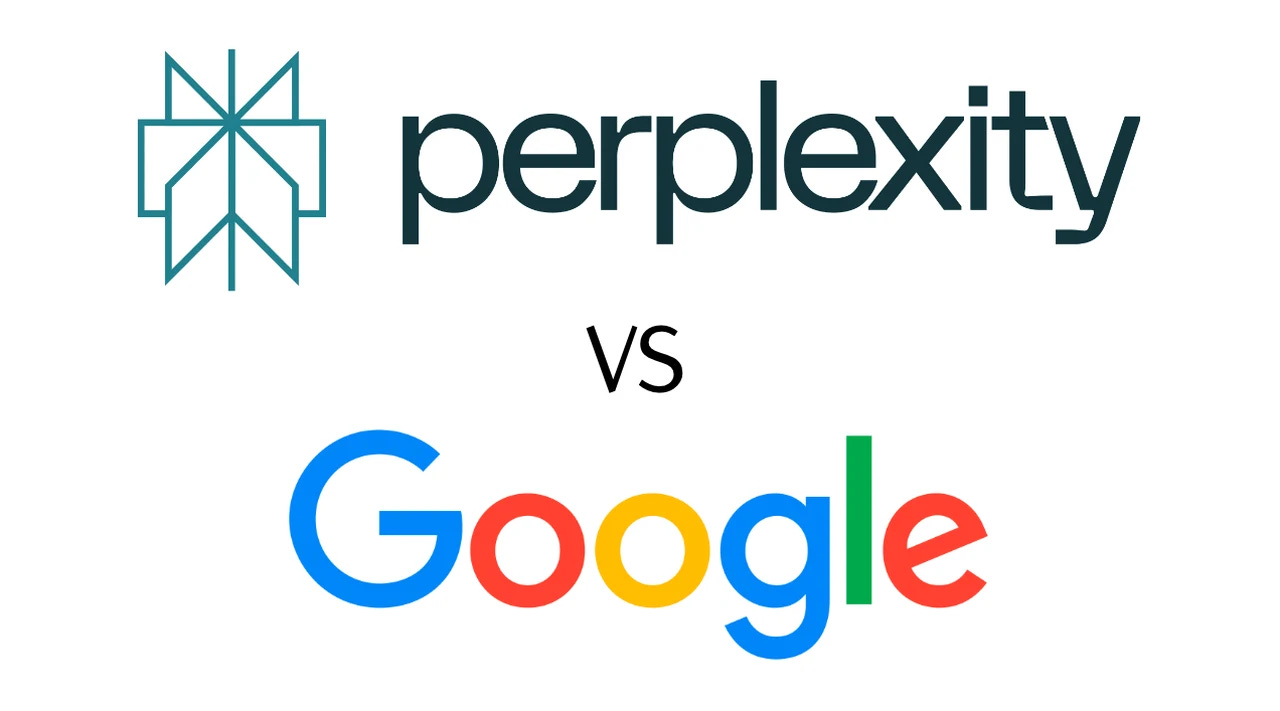
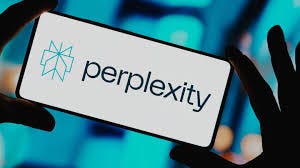
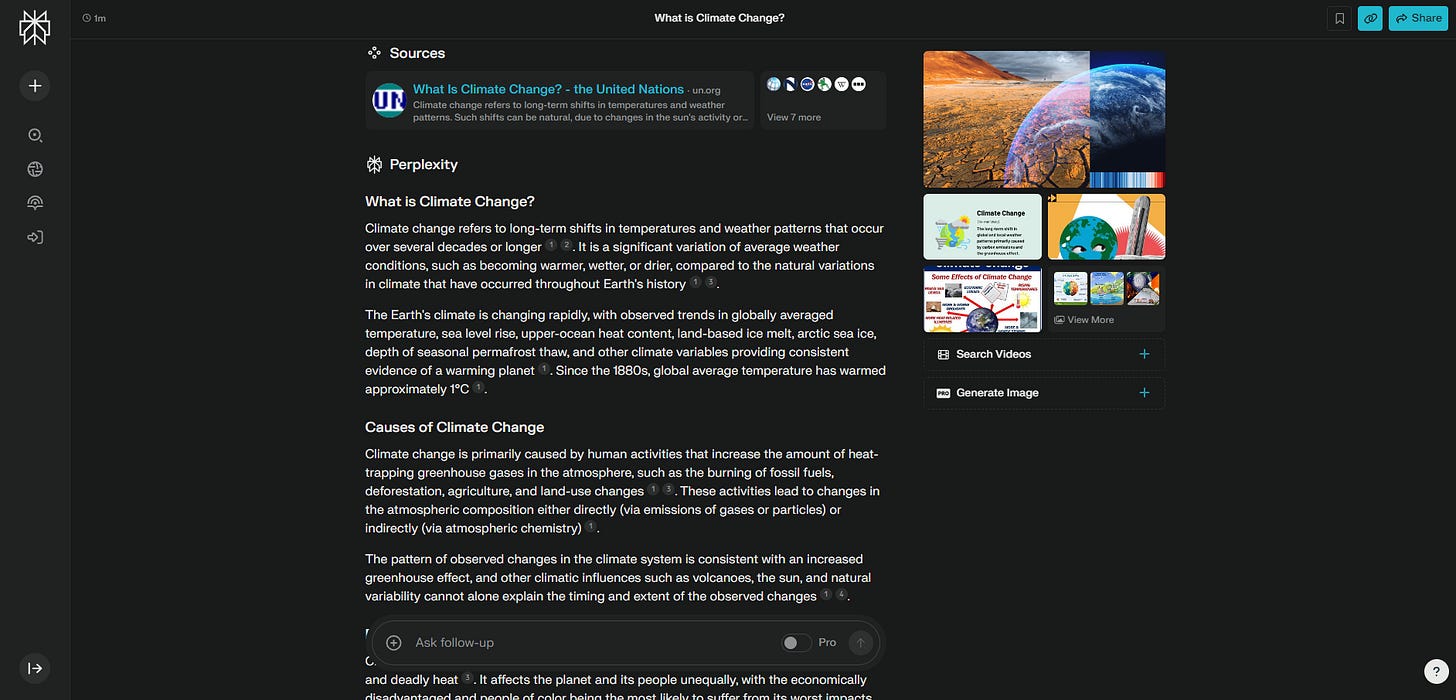
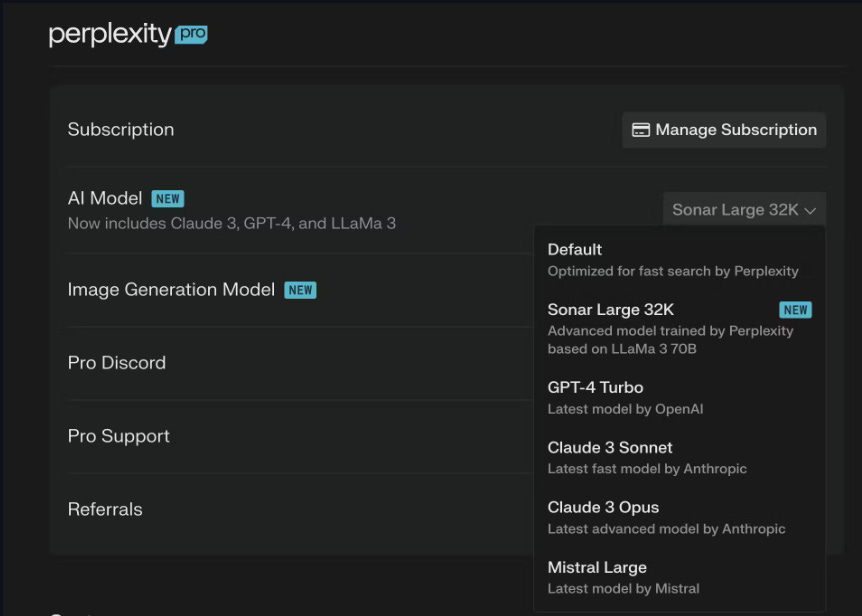
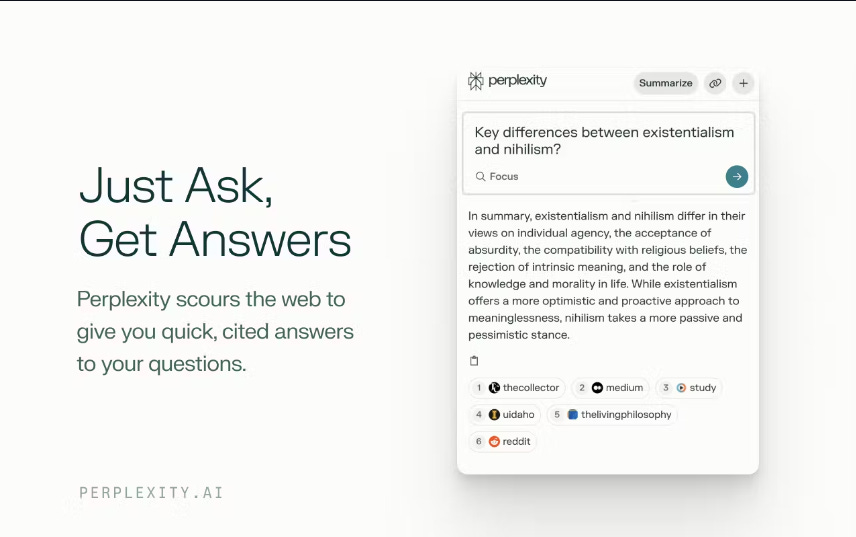

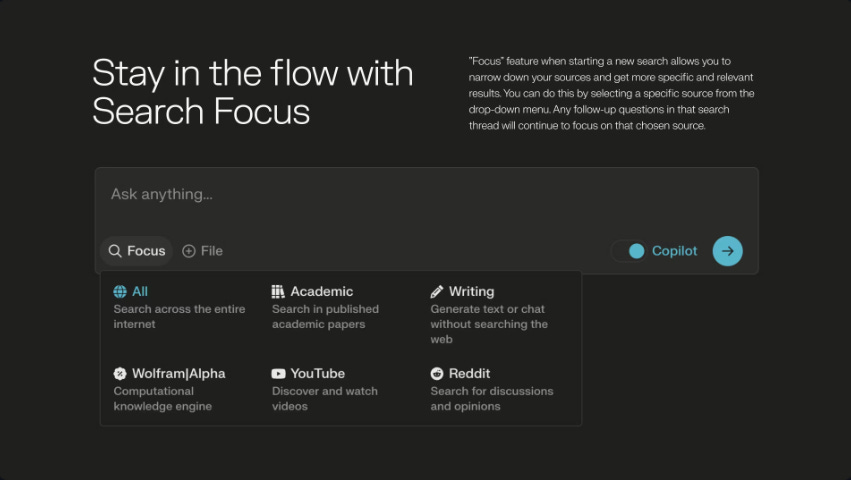
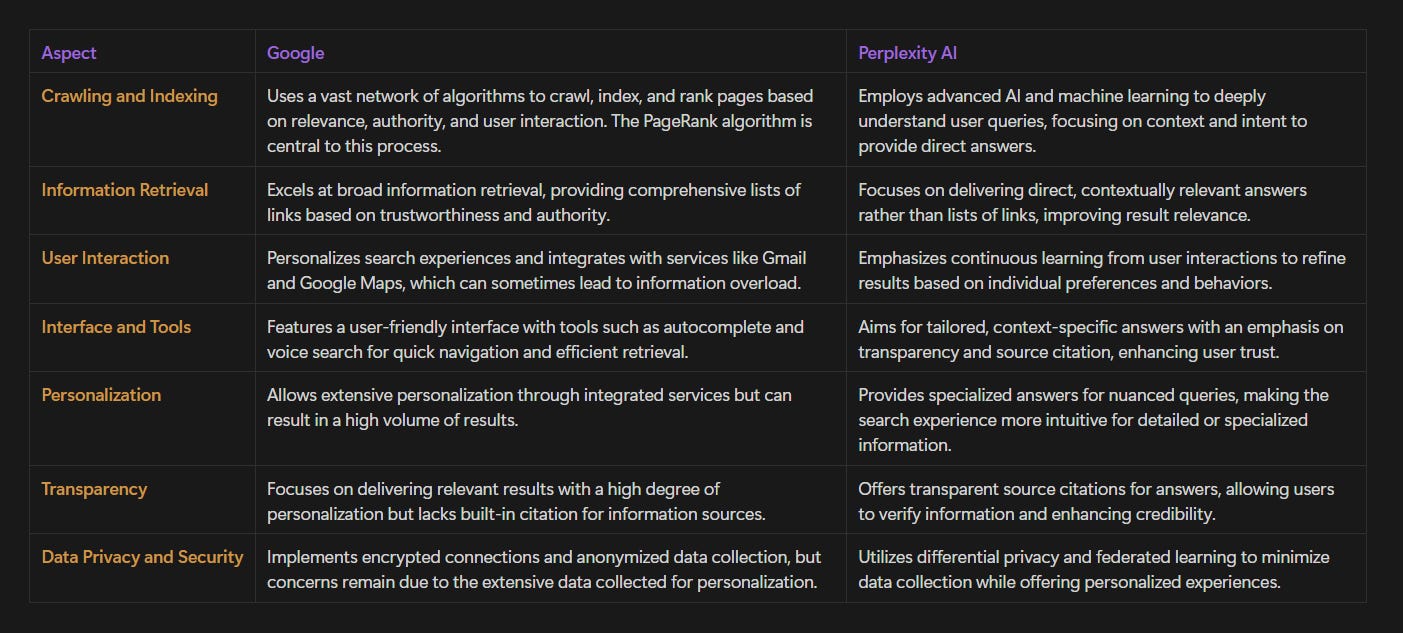
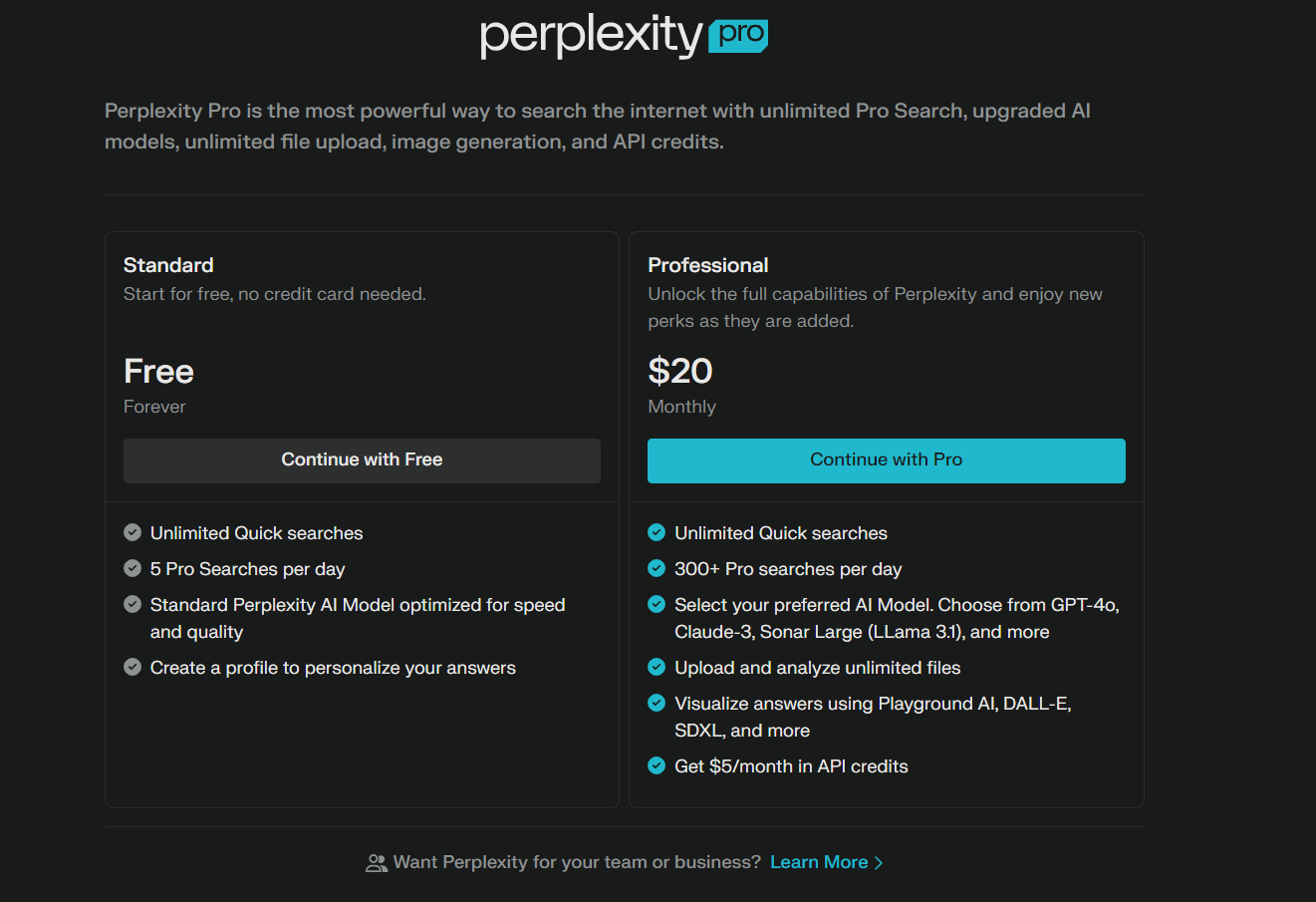
Great breakdown, really appreciate this.
I somewhat disagree with your `Google vs Perplexity search algorithms:` section though. In the first row (crawl & indexing), you're not comparing apples to apples. In the Google column you talk about crawling open web content, indexing it, and ranking it. In the Perplexity column, you talk about using AI to understand the searcher's intent. That's one (or more) steps too far.
Where does Perplexity get its content from?